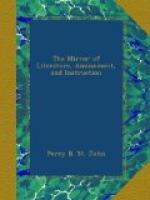“I said I fancied I was he that he meant, though I had never made ony very auld ballads.”
“Ay, then, lad, gae your ways in an’ speir for the Shirra. They’ll let ye see where he is. He’ll be very glad to see you.”
During the sociality of the evening, the discourse ran very much on the different breeds of sheep, that curse of the community of Ettrick Forest. The original black-faced Forest breed being always called the short sheep, and the Cheviot breed the long sheep, the disputes at that period ran very high about the practicable profits of each. Mr. Scott, who had come into that remote district to preserve what fragments remained of its legendary lore, was rather bored with the everlasting question of the long and the short sheep. So at length, putting on his most serious calculating face, he turned to Mr. Walter Brydon and said, “I’m rather at a loss regarding the merits of this very important question. How long must a sheep actually measure to come under the denomination of a long sheep?”
Mr. Brydon, who, in the simplicity of his heart, neither perceived the quiz nor the reproof, fell to answer with great sincerity,—“It’s the woo, sir—it’s the woo that makes the difference. The lang sheep hae the short woo, and the short sheep hae the lang thing; and these are just kind o’ names we gie them like.” Mr. Scott could not preserve his grave face of strict calculation; it went gradually away, and a hearty guffaw followed. When I saw the very same words repeated near the beginning of the Black Dwarf, how could I be mistaken of the author? It is true, Johnnie Ballantyne persuaded me into a nominal belief of the contrary, for several years following, but I could never get the better of that and several similar coincidences.
The next day we went off, five in number, to visit the wilds of Rankleburn, to see if on the farms of Buccleuch there were any relics of the Castles of Buccleuch or Mount-Comyn, the ancient and original possession of the Scotts. We found no remains of either tower or fortalice, save an old chapel and churchyard, and a mill and mill-lead, where corn never grew, but where, as old Satchells very appropriately says,
Had heather-bells been corn of the best,
The Buccleuch mill would have had a noble
grist.
It must have been used for grinding the chief’s blackmails, which it is known, were all paid to him in kind. Many of these still continue to be paid in the same way; and if report says true, he would be the better of a mill and kiln on some part of his land at this day, as well as a sterling conscientious miller to receive and render.




